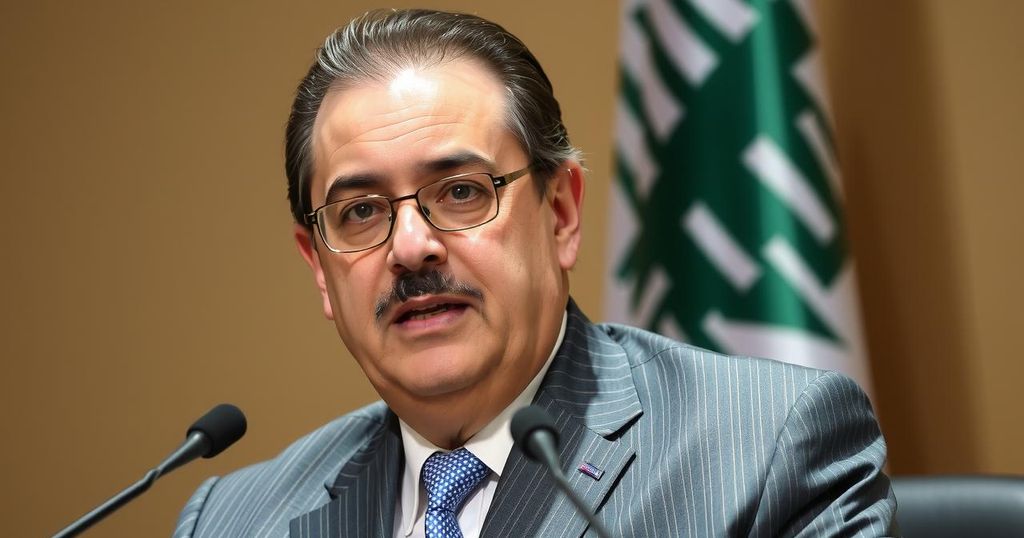World news
AFP, AO, AOUN, ASIA, COURT OF JUSTICE, DEMOCRACY, EUROPE, HAGUE, HAMAS, HEZBOLLAH, HUMAN RIGHTS, IC, ICJ, INTERNATIONAL COURT OF JUSTICE, ISRAEL, LEBANON, MIDDLE EAST, MIKATI, NAJIB MIKATI, NETHERLANDS, NORTH AMERICA, OPPOSITION, POLITICS, PRESIDENTIAL ELECTION, THE HAGUE, UNITED STATES
Elena Martinez
0 Comments
Nawaf Salam Appointed Prime Minister of Lebanon Amid Economic Crisis
Lebanon’s President Joseph Aoun has appointed Nawaf Salam, presiding judge at the ICJ, as Prime Minister to address the country’s economic crisis. Salam’s nomination received overwhelming support from lawmakers, signaling a potential shift away from the previous caretaker administration. Amid ongoing challenges, Salam will strive for governance reform as Lebanon faces severe financial instability.
Lebanon’s President Joseph Aoun has appointed international jurist Nawaf Salam, currently serving as presiding judge at the International Court of Justice in The Hague, to form a new government. This decision follows over two years of a caretaker government amid a severe economic crisis. The appointment received overwhelming support from Lebanese lawmakers, with 84 endorsing Salam, while only nine favored the continuation of interim Prime Minister Najib Mikati.
Salam, who was abroad at the time of the announcement, is set to return to Lebanon for this critical endeavor. President Aoun expressed optimism about the swift formation of a government, indicating a commitment to restore order and address the country’s deepening economic issues. The backdrop of this appointment includes significant political dynamics, including a notable decrease in influence from the Iran-backed militant group Hezbollah, particularly following their recent conflicts with Israel.
Independent lawmaker Firas Hamdan hailed Salam’s nomination as a “purely Lebanese political initiative,” emphasizing a break from foreign interference. Salam’s supporters regard him as a neutral administrator capable of implementing essential reforms. Meanwhile, critics of the previous administration perceive the lasting influences of the crony political system through figures like Mikati, which they believe contributed to the nation’s financial downfall.
The new Prime Minister will grapple with substantial challenges, including enacting reforms to attract international aid, justifying the demands of Lebanese citizens for accountability, and addressing the destruction left by previous conflicts. Lawmaker Georges Adwan of the Lebanese Forces highlighted the need for Hezbollah to transition towards political engagement over armed conflict, reflecting a shift in the political rhetoric of the Mashriq region.
Despite broad support for Salam, including from opposition members previously aligned with other candidates, the constitutional framework requires that the Prime Minister’s acceptance does not automatically assure a smooth transition to a functioning government. Navigating Lebanon’s historically fractious political landscape may yet delay substantive governance reforms as political factions negotiate their interests.
The political landscape in Lebanon has been marked by instability and economic turmoil exacerbated by the prolonged absence of an effective government. A caretaker government has been managing state functions for over two years, amid pressing economic challenges that have affected the livelihoods of the Lebanese people. The appointment of Nawaf Salam, a respected jurist with international experience, signifies a potential shift in Lebanese politics, particularly in response to public discontent with corruption and inefficiency. President Joseph Aoun’s ascent to power coincided with a decline in Hezbollah’s dominance due to adverse outcomes in regional conflicts, especially the latest war with Israel. The resulting political void and public demand for reform have escalated calls for a principled and unbiased government capable of reversing the economic collapse and restoring public trust. This transition offers both opportunities for reform and complexities, as various factions navigate their positions in a challenging environment shaped by both internal and external pressures.
In summary, the appointment of Nawaf Salam as Prime Minister marks a pivotal moment for Lebanon as the country seeks to emerge from a prolonged period of instability. With broad support from Lebanese lawmakers, Salam’s leadership is seen as a potential catalyst for much-needed reforms amid dire economic conditions. However, navigating the deeply entrenched political divisions remains a considerable challenge. Lebanon’s future stability and recovery will largely depend on the ability of the new government to foster consensus and implement vital changes in governance and accountability.
Original Source: www.hindustantimes.com




Post Comment